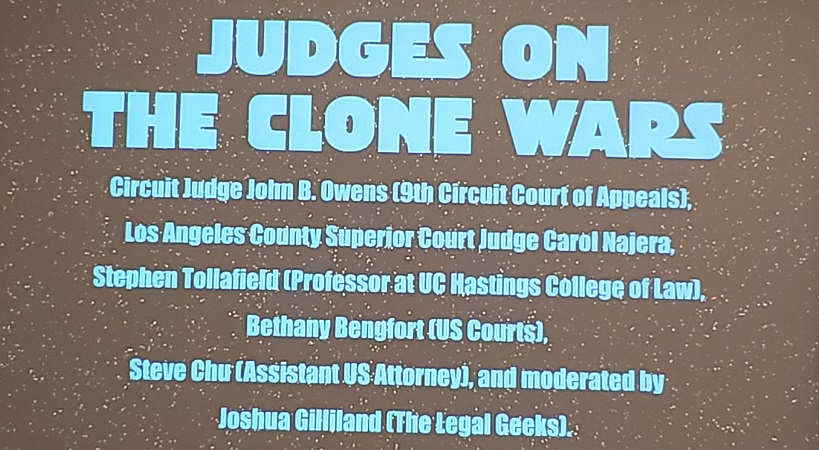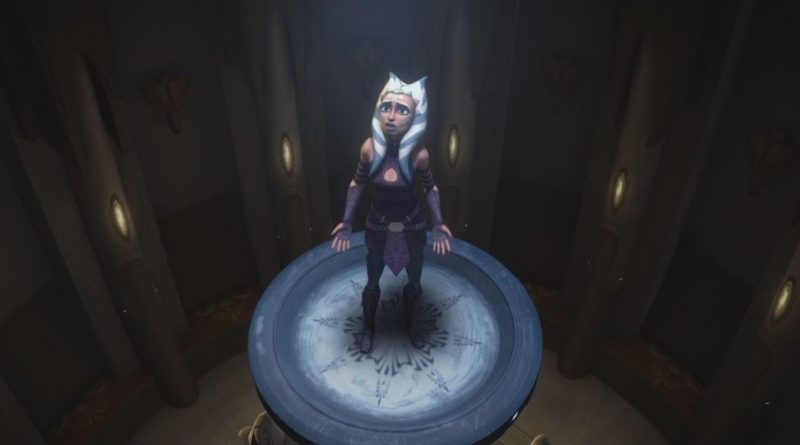SDCC 2019: Judges on The Clone Wars
At last year’s San Diego Comic-Con, the Legal Geeks presented a well-received panel featuring a mock court-martial of Poe Dameron based on his insubordination and mutiny during the event of The Last Jedi, complete with real-world judges and lawyers adjudicating the case and cosplayers in character to portray the individuals from the film. This year, in anticipation of the upcoming release on Disney+ of new episodes of The Clone Wars animated series, the Legal Geeks assembled a panel of judges and lawyers to discuss the wide range of legal issues presented over the span of its existing six seasons.
With rare exceptions – and understandably so! – Star Wars storytelling does not delve into the applicable principles of law in the galaxy far, far away or devote time to addressing how the justice system would evaluate the lawfulness of the actions taken by the characters. For that reason, the panel generally steered clear of the in-universe ramifications of issues presented in The Clone Wars, but rather assessed the analogies that can be made to real-world legal concepts for those scenarios. Topics discussed varied widely across the series: Cut Lawquane’s desertion from the clone army, the participation of younglings in the dangerous activities of the Jedi Order, Lok Durd’s defoliator as unlawful extermination or experimentation under the Geneva Conventions, the Jedi Council’s involuntary psychiatric hold on Yoda after he began to hear the voice of Qui-Gon Jinn, the liability of Boba Fett for impersonating a clone cadet and attempting murder-for-hire in pursuit of vengeance against Mace Windu, and whether the clone troopers could be held legally responsible for executing Order 66 as a consequence of genetic coding and the implanted inhibitor chips.

Each panelist presented their analysis on several topics, with some of their personal areas of interest shining through. Judge John B. Owens of the United States Court of Appeals for the Ninth Circuit examined the conflict between the nature of clone soldiers at sentient beings and the authority of the Kaminoans and Jedi Order to engage in genetic modifications and other involuntary medical experimentation. Unfortunately, he concluded that the clones appear to be treated as equivalent to droids in terms of their lack of in-universe legal rights. Professor Stephen Tollafield of the UC Hastings College of Law looked at the secret marriage entered by Anakin Skywalker and Padmé Amidala at the end of Attack of the Clones. While the story point is important for their character development, in the real world a marriage license is a public record, and only two U.S. states authorize exceptions in very limited circumstances which clearly do not apply to the Skywalker-Amidala union.
Judge Carol Najera of the Los Angeles County Superior Court considered the criminal charges that could be filed under California or federal law against Hondo Ohnaka for his actions in attacking the Jedi transport in the Younglings Arc to steal the kyber crystals: air piracy, gassing, robbery, attempted murder, and human trafficking with salacious purpose, among others. She also noted that Hondo’s story developed considerably over time, from initially a secondary villain in The Clone Wars to an unreliable ally of sorts in Star Wars Rebels to a featured character in the Millennium Falcon: Smugglers Run ride at Galaxy’s Edge in the Disney theme parks. Bethany Bengfort, employed at the U.S. Courts, walked through the applicability of the federal RICO crime to the activities of Maul and his brother Savage Opress in creating and running the Shadow Collective, undoubtedly a criminal enterprise carrying out a pattern of racketeering activity. Assistant United States Attorney Steve Chu compared the applicable rule in the U.S. and German militaries to the actions of the clone troopers in disobeying General Pong Krell’s unlawful orders during the Battle of Umbara, noting that German law, unsurprising given its recent history, places more emphasis on legality than obedience.
For those interested in watching the entire session, the Legal Geeks have posted a full video and audio of the panel on their website.











